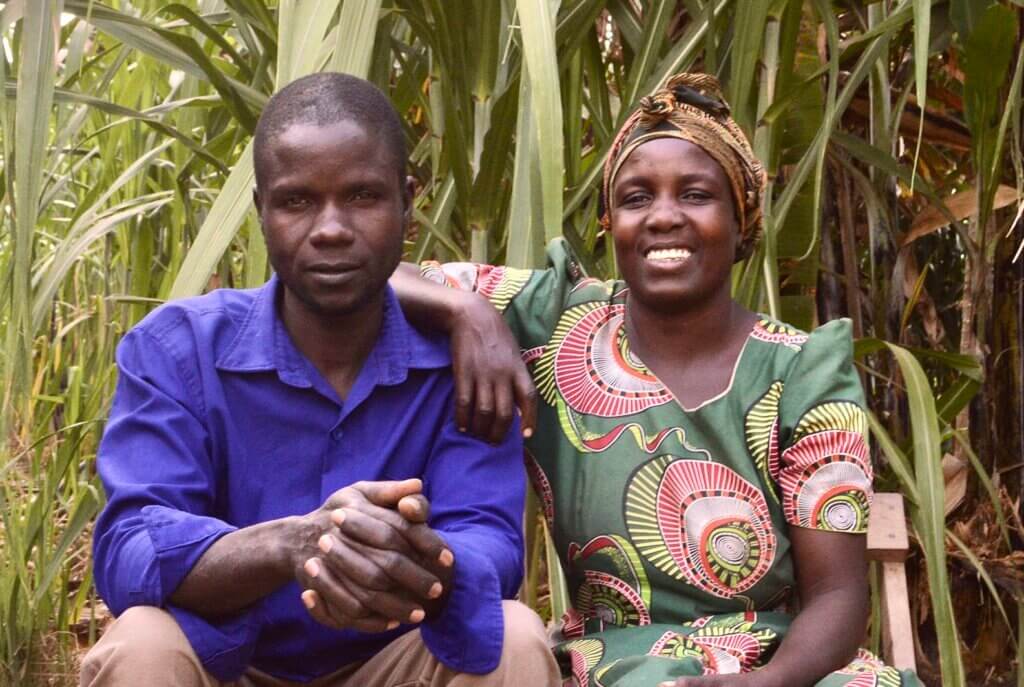Some people say that Valentine’s Day is just a money-maker for greeting card and chocolate companies. But celebrating love has been a manifestation of amorous relationships for centuries. And there are all kinds of people-to-people love—for partners, spouses, children, parents, friends, extended families, and others who have brought meaning into our lives. With Valentine’s Day coming up, MHF would like to share a story of the restoration of love in a family that suffered the consequences and healing of childbirth fistula:

Deborah, 30, a fistula survivor, goes about her domestic chores as she hums melodiously at her home in the Serere District, in eastern Uganda. She’s visibly warm and happy! It’s a far cry from the emotional face she wore about a year ago when she turned up seeking treatment at Terrewode Women’s Community Hospital (TWCH).
Deborah talks excitedly about her life. “I’m now okay. I can freely socialize with people. Love has returned into our relationship. I used to be scared every time I went out in public. And that was not so often. I feared the stench of urine that clung on me everywhere I went. I was always afraid people were talking behind my back. That’s no more.”
A lush plantation of sugar cane, yams and plantains, which measures close to an acre, sits at the back and to the sides of a compound, almost enclosing the homes of four neat traditional huts.
How Deborah’s life became unbearable
A mother to four sons, at the age of 28, while giving birth to her fifth child, Deborah suffered a major tragedy. A ghastly delivery ended up in a stillbirth, a raptured uterus and an obstetric fistula.
Before she encountered this tragedy, Deborah had already planned to stop at her fourth child and had started on contraceptives. But her husband, Moses, had an undying desire for a girl child. He insisted she discontinue the contraceptives, and she conceived within the month.
Her fistula caused uncontrollable urine leakage for three years until the time she was repaired at TWCH in 2020. Those years were characterized by isolation, a bitter relationship with her husband, and colossal expenses for attempts to treat the condition in many health units without success. The family sold two ox-ploughs and multiple family properties to get money for treatment.
Deborah says that although Moses had married a second wife even before she suffered a fistula, he was supportive of her. The fistula [eventually] drained all the romantic and supportive moments in her relationship with her husband. When asked why, Moses stares at the ground and takes a News from Maternal Health Fund Strengthening Lives February 2023 Issue www.maternalhealthfund.org P.O. Box 1270, San Jose, CA 95108 Page 5 momentary pause for about eight seconds. Then, he raises his face and clears his throat. “Eong abull etuwo (let me break the guard),” he starts in proverbial Teso language, that means being honest.
“The smell of ‘raw’ urine that leaks out uncontrollably from a person is ten times smellier than ‘ripe’ urine that goes through the normal bladder and is urinated out by a person. Our sex life became terrible. Each time we had an encounter I felt like ‘raw’ urine was smeared all over my groin and abdomen. We separated beds, and then huts. I refused to eat her food because I felt she was unhygienic,” Moses narrates.
Following Deborah’s surgery, recovery and reintegration empowerment programs at TWCH, their relationship has returned to where it was prior to her fistula. Moses says her forgiving and loving approach tightened their erstwhile loose romantic strings. In fact, Moses separated from his second wife and bonded back with Deborah.
“I sat alone and thought to myself, ‘I didn’t get this woman (Deborah) with this [fistula] condition, and neither did she apply to the doctors to get it. I will go back to my loyal and respectful wife.’ My wife can no longer produce because her raptured uterus was removed. It does not worry me anymore that she doesn’t have a girl child. Children are a gift from God irrespective of the sex.”
Though she’s accepted the reality of being unable to bear a child again in the quest for a daughter, Deborah has convinced herself that her sons will produce granddaughters for her.
The couple earns regular income from the sugarcane, yams and plantains planted in the backyard. “Each week, we harvest about three bundles of sugarcane and a bunch of bananas. We sell each sugar cane bundle at Shs 15,000 (about $4 US) and Shs 20,000 (about $5 US) to retailers. A full bunch of plantains goes for Shs 8,000 (about $2 US) and Shs 15, 000 (about $4 US). I also boil the yams and sell them on a market day here every Saturday,” Deborah explains.
Moses has two pieces of land in the area. One piece is allocated to Deborah and her children for subsistence farming, while the other piece is used for commercial farming.
“My heart is now at peace. The person (second wife) who used to torment me every now and then is gone. [My love with Deborah] is renewed. We are planning our activities as a couple again. Like other couples, we fail to agree at times. But we resolve matters together,” Deborah observes. Both Deborah and her husband have become active community advocates seeking out girls and women suffering from obstetric fistula.